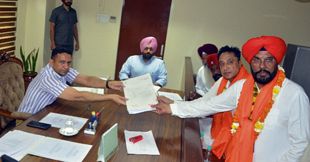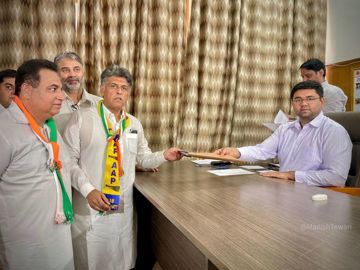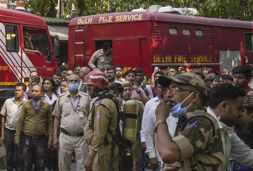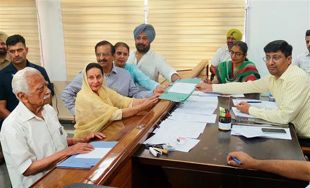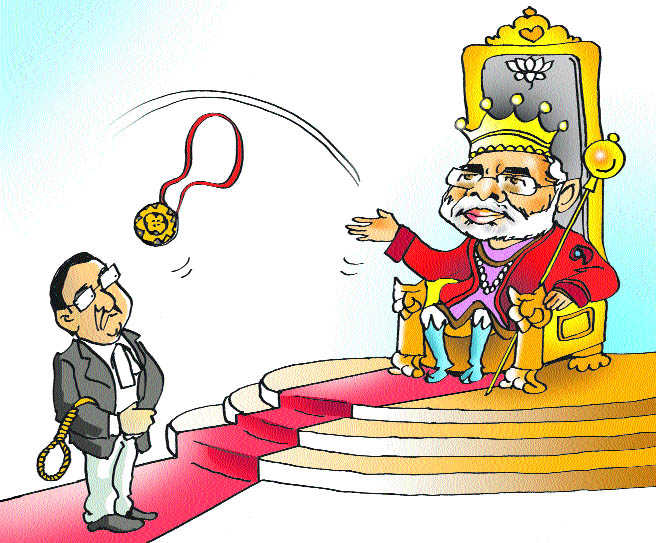
Sandeep Joshi
Harish Khare
IN the feudal times, kings and monarchs were known to reward with royal honours those whose loyalty and performance they approved of. The modern democratic state, too, carries in its copious bag of tricks a number of medals and awards that it hands out to a handful of citizens. The award of state honours is not a matter of simple choice. When a regime singles out individuals for state honours, in a way, it identifies itself with the performances, preferences and prejudices of those selected. The Padma awards, our republican version of the Queen’s Honours List, too, carry with them a sense of approval and appreciation of the honoured individual’s presumed achievement.
No Padma list is ever perfect. Nor can it be. A Padma list reflects choices made — or, not made by a government, which in turn is a political arrangement. This year, too, on the eve of Republic Day as many as 83 men and women were picked for the Padma honours. As in the previous years, the awards reflected the incumbent government’s sense of affiliation and solidarity with those on the list. However, there is one name among the 83 awardees that particularly demands attention because it is as revealing as it is disquieting.
Ujjwal Nikam gets the Padma Shri in the public affairs category. Nikam is a lawyer for the state of Maharashtra. There is no doubt that he is an accomplished legal hand and that he has a natural courtcraft, an asset that eludes very many in the world of lawyers and judges. But he is no legal luminary. He is not an MC Setalvad nor a CK Daphtary nor a Fali Nariman. Nikam is a very public prosecutor, seeking vengeance on behalf of the State against those who defy the magistracy of the law. In a society that normally cheers those who stand by and seek insaaf for the underdog, Nikam stands for punishment to one and all. Severe and harsh. An equivalent of the ‘hanging judge’. As a public prosecutor, he demands, loudly and insistently, vengeance and retribution on our collective behalf. He likes to market himself as a modern-day Savonarola.
Nikam is best known as the man who successfully prosecuted Ajmal Kasab and Yakub Memon, two men who in public imagination had waged war against the Indian state. He sent both to the gallows after prolonged and public trials. Perhaps, Nikam can count many others among his victims, but it is his success against Ajmal Kasab and Yakub Memon that has brought him public recognition — and, adoration in certain quarters. And it is this adoration that deserves our critical examination.
It may be recalled that this public prosecutor extraordinaire had made an extraordinary revelation in March, 2015. At a global conference on counter-terrorism in Jaipur, Nikam volunteered this information: “Kasab never demanded biryani and was never served the dish by the government. I concocted the story just to break an emotional atmosphere which was taking shape in favour of Kasab during the trial of the case.” As Nikam recalled for us, an “emotional wave” swelled up in favour of Kasab when he bent his head and wiped a tear from his eyes. Newspapers of the day reported Nikam’s thought process. Soon, the electronic media took the cue: “Tears in Kasab’s eyes”. It was Raksha Bandhan that day, and some speculated that Kasab had got emotional remembering his sister. Some even went on to question whether he was a terrorist or not. So, Nikam felt he had to counter that image (never mind the foisting of the Raksha Bandhan sentimentality on Kasab). He fabricated a lie that the ‘terrorist’ was demanding that he be served biryani. Mutton biryani, at that. Horror of horrors!
This choice of biryani as a favourite dish was not an innocuous one. Biryani is a politically loaded code word. This delicious Awadhi dish was first given a political flavour by LK Advani, when he had drawn a deadly comparison between the secessionist-terrorists in Kashmir and the ‘Ram bhakts’. Advani, it need be recalled, had accused the Narasimha Rao government of serving biryani to a bunch of terrorists who had holed themselves up in the Hazratbal shrine in Srinagar in October 1993, while the same government had no remorse in firing at the ‘Ram bhakts’, who simply wanted to bring the Babri Masjid down and build a temple in its place. The comparison was, of course, meant to underline the irreconcilable antagonism between Hindus and Muslims, between deshbhakts and traitors, between heroes and villains. Since then, ‘serving biryani’ has become synonymous with a weak and ineffectual government and an ineffective judicial system that simply cannot put away the jihadi mischief-makers.
This allegory was again invoked recently when a Coast Guard commandant, BK Loshali, had told a cheering audience how he had ordered the blowing up of an explosives-laden Pakistani boat rather than capturing the suspected ‘terrorists’ alive because “we don’t want to serve them biryani”.
So when (now Padma Shri) Nikam introduced the biryani-myth in public discourse, he was subscribing to the politically loaded categories of strong and ambivalent leaders. He was betraying lack of faith in the much-vaunted robustness of the Indian trial system. He seemed to be calculating that more than forensic evidence and sound legal arguments, the presiding judge might allow himself to be swayed by ‘public opinion’. And, of course, Nikam had mastered the tricks of our television age — the camera’s need for a dramatic, outrageous, outlandish sound-byte. He had brilliantly dissected the electronic media’s nerves of vulnerability and how it could be manipulated to stoke our fears and phobia, to manufacture a public opinion favourable to the prosecution.
A favourable public opinion consecrates itself into national conscience, which, then, acquires a sanctity higher than that of the law. The Supreme Court itself put its seal of judicial approval on the ‘collective conscience’ principle in the matter of Afzal Guru. He was hanged after being proclaimed guilty in the case of the attack on Indian Parliament House. The court, it may be recalled, had formulated that the attack had “shaken the entire nation and the collective conscience of the society will only be satisfied if capital punishment is awarded to the offender”.
Ujjwal Nikam understood the importance of moulding, manipulating and manufacturing a public opinion by pandering to the majority’s prejudices. He not only knows his onions, but he also knows his mind. And that mind is full of illiberal certitudes.
No one should grudge Ujjwal Nikam a Padma award. But we should and must resent those who chose to honour him and his punitive triumphalism. The ruling dispensation has chosen to perpetuate our visceral animosities, devaluing the authenticity of our judicial system and cheapening our own sense of fairness. Sadly enough, a single Padma award has robbed us of our nobility.





















